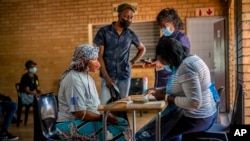African health authorities are calling for better coordination to ensure COVID-19 vaccines are distributed quickly to all African nations.
Vaccine supplies have surpassed demand for the first time since the pandemic began two years ago. But health officials at a conference in Nigeria said Wednesday that a lack of refrigeration and poor infrastructure were major challenges for vaccine equity.
The African Union's Vaccine Delivery Alliance organized the conference to highlight hurdles many African countries face delivering COVID-19 vaccines to their citizens.
Tian Johnson, an AU community engagement official, said, "What we see before us through the magnifying glass of COVID-19 are the fruits of decades of deprioritizing health at country levels. The fact remains, as Africans we must be absolutely sure that we leave no one behind."
About 20 percent of Africa's 1.2 billion people have received at least one dose of a coronavirus vaccine, a poor record compared with those of many Western nations, where vaccination rates are at 70 percent or better.
Lack of infrastructure
Many African countries, including Nigeria, lack the infrastructure and cooling systems to store vaccines in large quantities.
Last year, up to 1 million doses of COVID vaccines expired in Nigeria, the highest single number in any country.
Officials said the vaccination gap is made worse by lack of funding, which limits African countries' ability to properly receive and distribute vaccines.
A February publication by COVAX — the global vaccine program supported by the WHO and Gavi — showed low-income countries requested only 100 million doses of vaccines out of 436 million doses available.
In Nigeria, where only about 6 percent of people are vaccinated, authorities also have been battling widespread vaccine hesitancy, which authorities partly blame for the low inoculation rate.
Nigerian President Muhammadu Buhari said at the Vaccine Delivery Alliance conference, "Global solidarity and proactive leadership is the only way we will beat this virus. This high-level summit calls for greater solidarity and for the world to hear Africa's voice on how we can beat the virus together."
Buhari said authorities were accelerating vaccinations in Nigeria to save lives and kick-start economic recovery.
Vaccine production
The World Health Organization last week said Nigeria and five other African countries would be the first on the continent to begin local production of COVID-19 vaccines. The WHO said training for vaccine production could begin in a matter of weeks.
WHO chief Tedros Adhanom Ghebreyesus, one of the speakers at Wednesday’s conference, said, "WHO and our partners are working day and night to address the bottlenecks that remain in partnership with countries. We are on ground to do whatever it takes to reach country goals, not only on vaccines but for testing and treatment."
Experts say until Africa is largely vaccinated against the virus, the world will remain unsafe.





